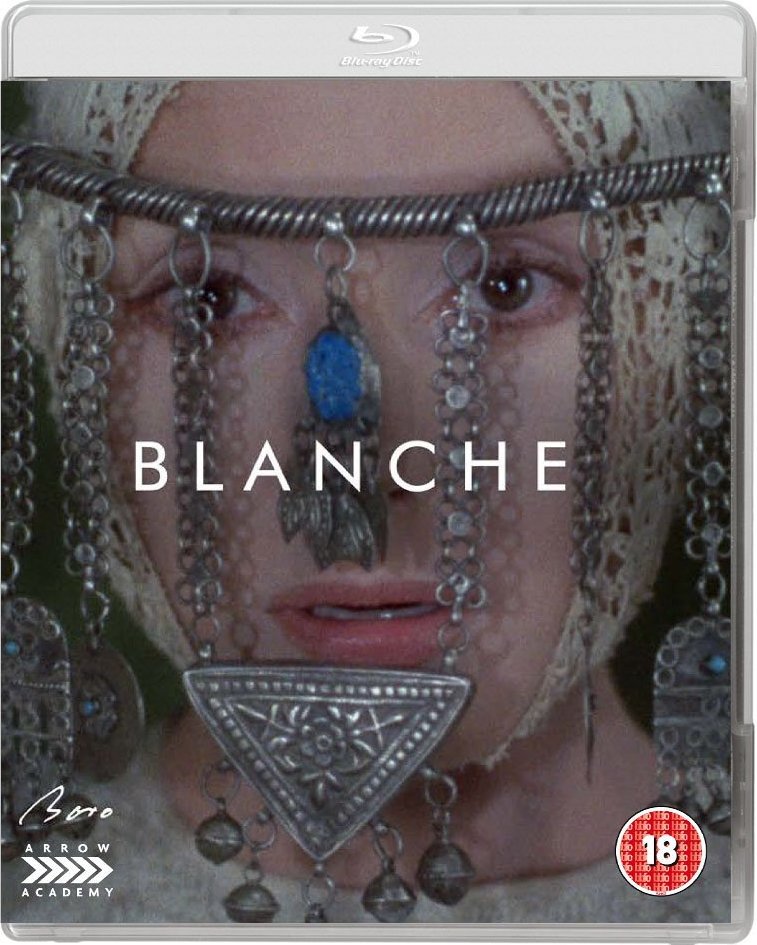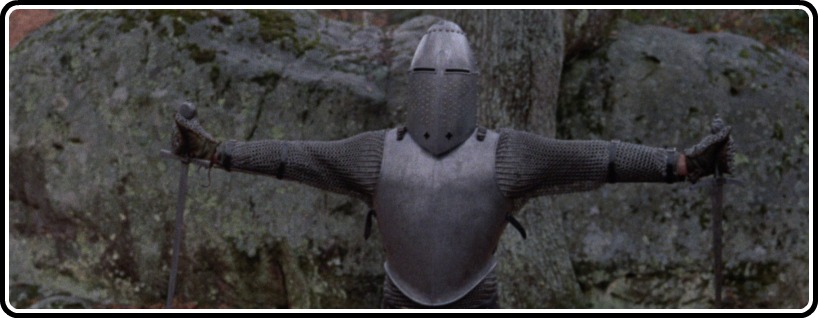
There’s nothing really explicitly fantastic about Blanche, and yet its roots in fairytale are more tightly-woven than those in historical fiction. Set in a sort of loosely-defined “Middle Ages,” Blanche could very well take place a country (or an estate) away from such 1970s contemporaries as Jacques Demy’s Donkey Skin, Pier Paolo Pasolini’s The Canterbury Tales, or Terry Jones and Terry Gilliam’s Monty Python and the Holy Grail. Any silliness is cut with a rather deranged sense of the limits of the human body.
The film opens with a series of images cut in and about the title sequence, the most important of which is that of the titular character (Ligia Branice) emerging from a bath, completely nude. Branice is a lovely woman, but the nature of her surroundings (a stone castle), the way her hair is tangled and mussed up, her posture (arms bracing the walls as she steps down), the sheer mundanity of the activity, and writer/director Walerian Borowczyk’s framing (wide, observing her whole body) reduces almost entirely the sexual component that ordinarily accompanies this sort of voyeuristic activity. She seems gangly, contorted, and somewhat grotesque. She is literally standing above the servant holding her towel, but Borowczyk has effectively removed the pedestal onto which men will place her for the remainder of the picture, their desire for the flesh she displays here driving nearly all of the film’s action. Because Borowczyk so plainly and simply unveils her to us, in a way that reduces her allure, the ensuing quest will seem all the more silly, and thus all the more tragic.
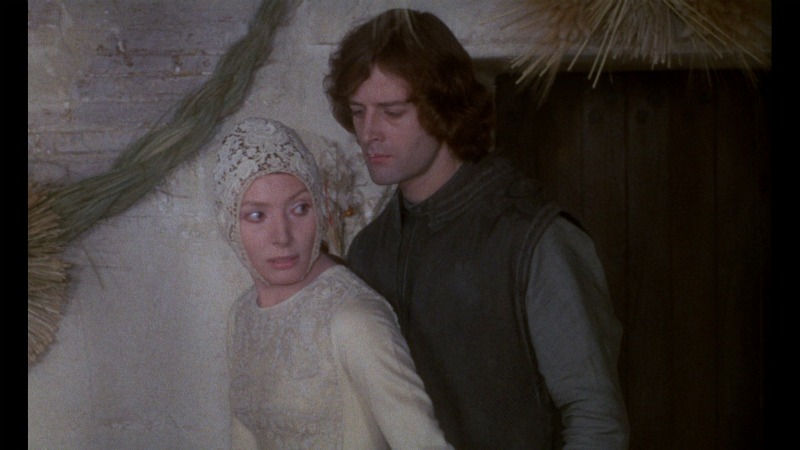
Blanche is married to a baron (Michel Simon) who clings to life as a glutton to sweets. He cannot stop delighting in its pleasures, and somewhat fears their absence. Simon made a career of exploiting his rotund figure and melting face, and it’s somewhat inspiring to see him chase degradation at nearly eighty years old (Blanche was among his final films; he died three years after its release). His story is common to men of a certain age who marry younger women, spending too much time and energy jealously guarding her to actually enjoy her company. The competition is fierce. There is the visiting King (Georges Wilson). The King’s page, Bartolomeo (Jacques Perrin). Even the Baron’s own son, Nicolas (Lawrence Trimble), whose affections Blanche nervously returns.
Things all go a bit awry with the attempt to deliver a message, a presumption of guilt, and a wall erected with an unfortunate soul behind it. But the sense of suffocation starts much sooner, in the dim hallways, made even darker by night, as Blanche must constantly watch her every move for fear of retaliation on the part of the man who gives her the life she has, while at the same time slowly taking it away. Even in the one scene we see them share a kiss, Simon’s sagging flesh threatening to swallow the smoothness of Branice’s youth, we see her glancing for an escape. He repeatedly shames, threatens, mocks, and exploits her, their marriage merely a method in which to exercise power when his position does not grant it satisfactorily.
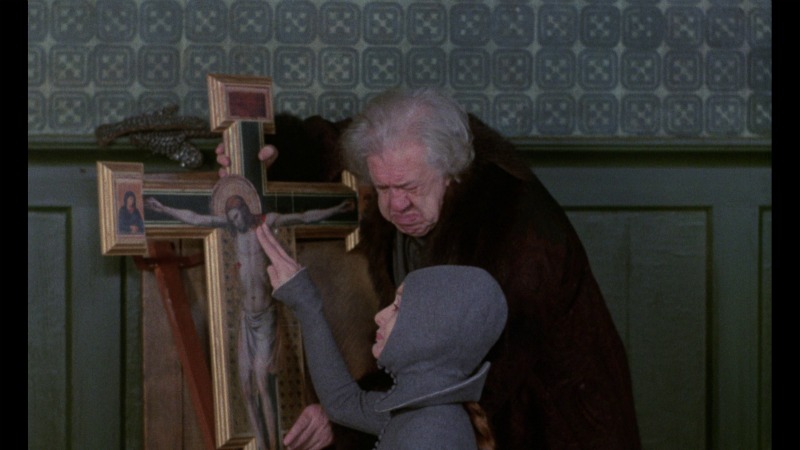
In many ways, Blanche feels like Borowczyk’s most mainstream film, at least of those Arrow has released. The sympathies are more clearly guided, the shots less didactic and carefully formal (handheld camerawork is employed to a great extent), and there’s less of the sort of bric-a-brac in set decoration and world-building that defined Goto, Isle of Love and will certainly inform The Immoral Tales. Yet his playful side is still gnawing at the edges, most especially when a group of priests transform their wardrobe and accessories (Bibles, crosses, and the like) into weapons, a moment fraught with thematic potential, but which he simply lets glide by. But this is generally a quite focused, lightly surreal medieval tale, and it’s little wonder that it is widely felt to be Borowczyk’s best film. It is generally true that the more an artist puts away his or her own preoccupations in the name of “story,” the more widely-accepted the work will be.
The high-definition transfer on Arrow Film’s new (Region-free!) Blu-ray is quite interesting. It isn’t an especially showy presentation of the film, often dark and muddy and a little soft, but that feels a perfect fit for the film at hand. Borowczyk is purposefully exploring the seedy, lurid, earthy nature of not only the time period, but any system that essentially puts human beings in captivity. Damage is quite minimal, grain is beautifully textured, and the colors seem faithfully rendered. I greatly admire and appreciate the tack (and tact) they have employed here.
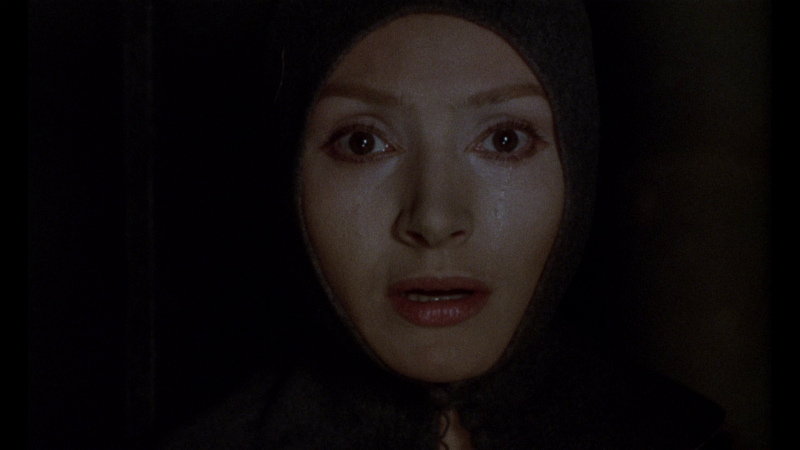
On the special features side, we get an introduction by director Leslie Megahey, a half-hour piece exploring the production of the film (which sounds to be Borowczyk’s most complex affair, eventually involving the shoot being shut down for nearly a month), a fantastic hourlong documentary making use of a 1985 interview with Boroczyk (edited in 2014 and incorporating clips from his films) that explores his entire career, Peter Graham’s intriguing short film Gunpoint, on which Borowczyk served as cameraman and editor, and an interview with Graham about their collaboration. The booklet includes a characteristically fine overview of the film by project producer Daniel Bird, excerpts of contemporary reviews, the Latin lyrics (with English translation!) of the song the accompanies the opening credits, and a 1996 Sight & Sound piece by Chris Newby. Whew!
Once again, Arrow have gone above and beyond in their passion project, serving a very good film with a spectacular presentation. The nature of the film makes it both an ideal place to start in exploring Borowczyk, in that it’s sort of like testing the waters before diving in, but I was never one to recommend that. Cinematically, anyway. When dealing with actual waters, do test them. You might hurt yourself.


